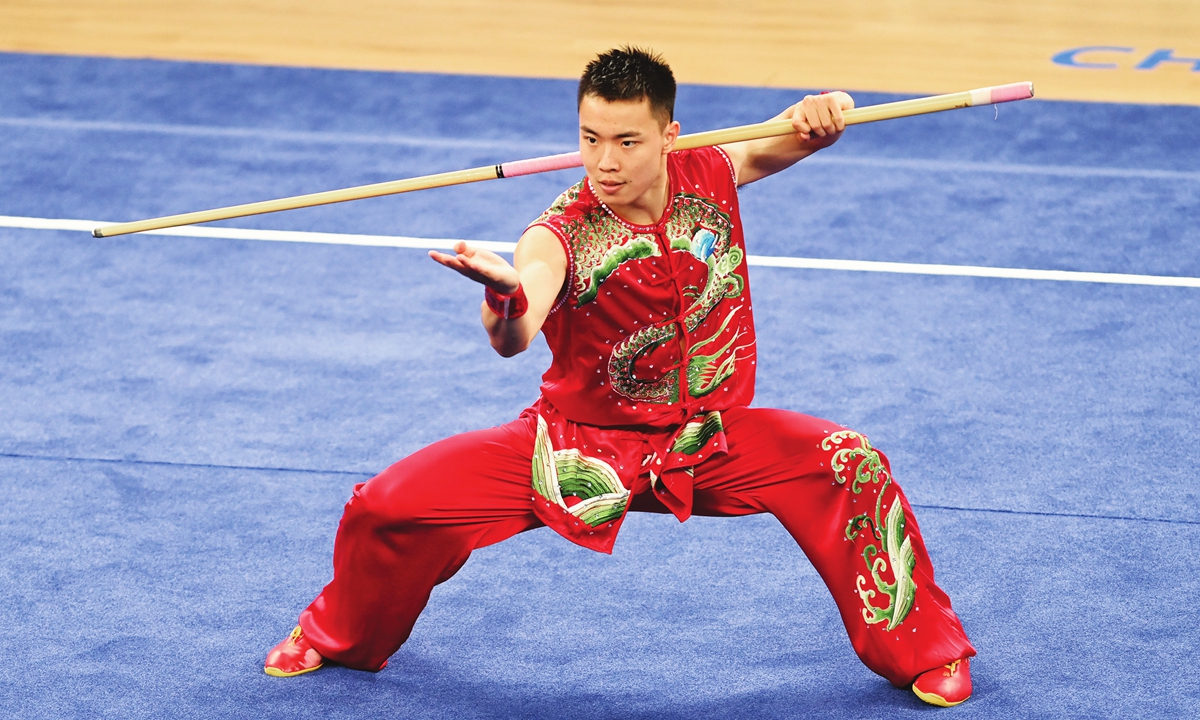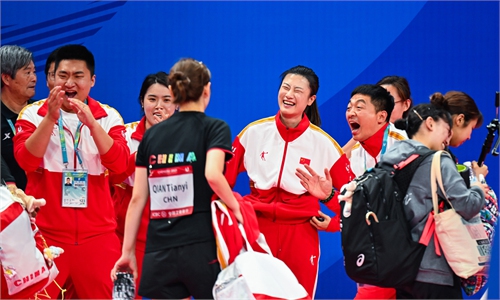ARTS / CULTURE & LEISURE
The opponent I need to overcome is in the mirror: FISU first gold medalist Cao Maoyuan
Kung fu talent

Cao Maoyuan Photo: VCG
The first gold medal for the Chinese delegation at the ongoing 31st FISU World University Games in Chengdu, Southwest China's Sichuan Province, was claimed by a Sichuan-born athlete in the traditional Chinese martial art sport, also known as wushu.
The 26-year-old Cao Maoyuan impressed audiences with a sublime routine in the Nanquan event on Saturday and was crowned the champion with a total point score of 9.77.
Martial arts star
Nanquan is a type of Chinese wushu genre most widely practiced in the area south of the Yangtze River. It is known for its swift, compact yet powerful movements.
After winning the first 2023 FISU gold medal, Cao told Global Times that the Games are a stage to present Chinese wushu to the international community.
"I'm proud to take part in the Chengdu Games. I hope people around the world will gain a better understanding of wushu and fall in love with it," Cao said.
Following a strong start, Cao claimed his second gold at the Chengdu Universiade with a compelling Nangun routine, a type of wushu routine involving rod play, on Sunday.
Cao said that winning two gold medals was "expected" as that was the goal.
"I am glad I have transformed this expectation into reality by adjusting my mood in the competition. My coach's unwavering support and our cooperation were critical in making such an achievement," he said.
It took a remarkably short 93 seconds for Cao to execute his Nanquan routine. But the short-lived yet triumphant performance is the reward of two decades of hard work.
The FISU gold medal is, however, not the only proof of Cao's talent in wushu.
Back to 2007, Cao won his very first gold medal at 10, a success that would be a great source of encouragement for him. Since then, he has won several other gold medals in competitions such as the Youth Championship in 2014. These awards have boosted his confidence, spurring his determination to choose wushu as his lifetime career.
Like many boys, Cao was captivated by the dramatic action seen in martial arts films when he was a toddler. He loved to mimic the moves while watching such films and a passion for martial arts took root in his heart, his mom told the media before the Games.
Heng Jinwei, Cao's coach of child protégée training in Weiyuan county, also Cao's hometown in Sichuan Province, described him as an up-and-coming athlete and believed that "nothing was impossible to him."
Heng also recalled that Cao started to show a "strong sense of ambition and ethic for hard work" when he was a boy. In 2002, Cao's father took him to a local sports school where Cao managed to train alongside other emerging sporting talents.
Bumpy but fruitful road
Despite sustaining a training injury to the head, which resulted in 13 stitches, Cao insisted on competing at an event and eventually came out on top. "He has been very passionate about wushu since childhood, and was very motivated and outstanding in all aspects," the coach told Global Times.
"Cao Maoyuan's love for wushu and his resilience have made him eager for competition from a young age, just like he has been participating in the Chengdu Games," Heng said.
Cao's athletic journey was made possible with the assistance of several mentors including Heng. In 2008, Cao was selected to train for the Sichuan Provincial-level Wushu Team.
Yu Bo, Cao's other coach told Global Times that the athlete was like a "wild horse that can run a thousand miles."
With a good skill set to master both Nanquan and the Nangun, Cao's biggest strength is that he is "tall, fast and powerful," Yu told Global Times.
Such physical strengths, especially height, however, can be a double-edged sword that has made both Cao and his coaches see the athlete's weaknesses in movements that appear less solid or grounded and more airy and light due to the athlete's stature.
"We have put a lot of effort into creating some routines to make up for his weaknesses, that also highlight his strengths," Yu noted, adding that transforming his weaknesses into strengths is the key to Cao's success.
The athlete always believes practice makes perfect, and if a day of practice skipped, then ten days' worth of effort will be in vain.
The philosophy has supported him go through setbacks.
The 14th National Games of China in 2021 was a painful memory for Cao.
Due to a mistake in his first move, Cao, an athlete who rarely tastes failure, didn't make it to the finals.
The setback has since been a source of motivation for Cao to push ahead in subsequent competitions, including at the Games, to which Yu told Global Times that the young man has "grown up" and possesses the qualities of a sports veteran.
"The opponent I need to overcome is always in the mirror, and I must surpass myself every day," Cao said.
Taking note of the fact that wushu is an internationally celebrated sport from China, Cao also said that he hopes every child who likes wushu will always enjoy and stick to the sport.
"The development and promotion of Chinese wushu cannot rely on just a few people. We need the entire young generation to work together."

